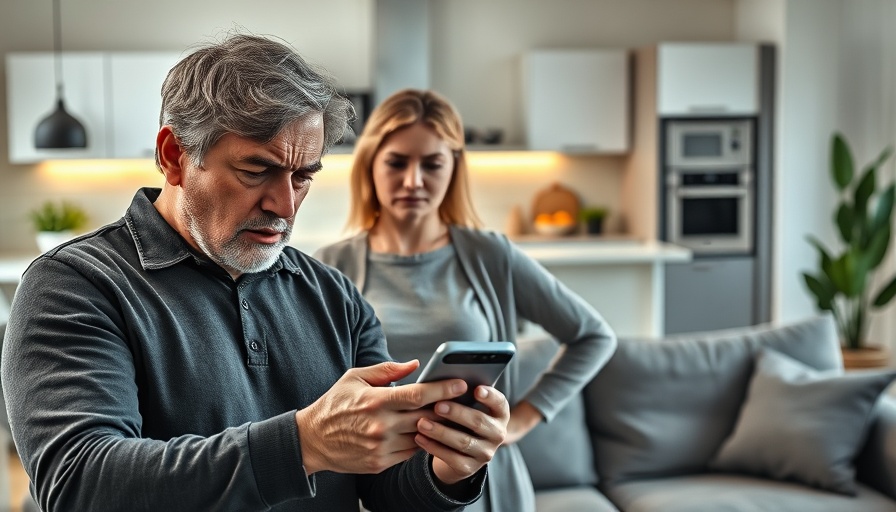
An Eye-Opening Look at 'Selective Hearing'
For many, the term "selective hearing" conjures images of a spouse tuning out a partner or children pretending not to hear instructions. But recent revelations from scientists tell a much deeper story. This phenomenon is not merely a choice or an act of defiance; it is a genuine neurological process that many experience, particularly as they age.
Understanding the Neurology Behind Selective Hearing
Selective hearing is fundamentally tied to how our brains process sounds. According to recent research, it reveals that our brains might prioritize certain audio inputs over others based on neurological pathways affected by age and experience. As adults develop hearing loss, their cognitive load increases, making it tougher to decipher conversations in environments where multiple sounds compete for attention.
The Impact of Untreated Hearing Loss on Cognitive Health
Untreated hearing loss is not just an inconvenience—it can significantly impact memory and cognitive functions. Dr. Mary S. Cohen, an audiologist, reveals that individuals using hearing aids are more likely to maintain cognitive clarity than those who don't. This recovery is supported by studies showing that the brain’s processing areas can be physically reinforced through effective auditory rehabilitation.
Social Implications and Personal Connections
For Louisianans over 55, the social consequences of selective hearing are all too real. Many may feel isolated, missing the nuances of conversations at family gatherings or in community events, which can lead to feelings of loneliness or frustration. Heartfelt stories from local seniors exhibit how restored hearing—from the use of hearing devices—has helped them reconnect with their families and friends, enriching their lives tremendously.
Future Predictions: The Emerging Role of Technology
As technology progresses, the future holds promise for those dealing with hearing loss. Innovative auditory devices equipped with AI are on the horizon, allowing for personalized sound filtering, which may help regain focused attention in noisy environments. This could empower individuals to participate in social gatherings more fully and mitigate feelings of isolation.
Counterarguments: There's More to the Story
While some may argue that selective hearing is merely a behavioral choice, it’s essential to understand the physiological aspects that contribute to this experience. Challenging this perception can lead to stigma around hearing impairments. Education about the neurological basis of hearing issues, such as selective hearing, can foster empathy and awareness in society as a whole.
Decisions to Make With This Information
Armed with knowledge about selective hearing, individuals can make informed decisions regarding their auditory health. Regular hearing check-ups are vital, particularly for those over 55. If you suspect that hearing loss may be affecting your quality of life, consulting with an audiologist can lead to interventions that facilitate better communication and enhance social engagement.
Practical Insights for Better Listening
Improving one’s listening environment can significantly affect how well individuals can hear and engage in conversations. Simple changes, such as minimizing background noise, positioning oneself closer to the speaker, and using assistive listening devices, can vastly improve interactions. Additionally, encouraging patience and understanding from loved ones can create a supportive atmosphere that nurtures better communication.
Common Misconceptions: Selective Hearing vs. Hearing Loss
A common misconception surrounding selective hearing is that it solely stems from willfulness or laziness. However, it’s important to recognize that it often has roots in hearing difficulties. Distinguishing between naturally selective hearing and problems linked to hearing loss can clear the air and foster understanding among seniors and their loved ones.
Empowering Quotes and Anecdotes
As local voices share their experiences, we hear uplifting stories of change. One senior shared, "Getting my hearing aid was like bringing color back into my life. I can finally engage in conversations and share memories with my grandkids." These narratives resonate deeply, highlighting how addressing auditory concerns can lead to newfound happiness.
A Call for Awareness and Action
Awareness around selective hearing and hearing loss can have profound benefits for individuals over 55, especially in Louisiana, where access to healthcare and resources can sometimes be challenging. By advocating for regular hearing assessments and engaging with technology, we can redress the imbalance of social engagement caused by auditory challenges.
As we age, our hearing deserves equal attention as other health issues. Taking action now can lead to a future filled with connections and joy. If you or someone you know experiences difficulties, consider reaching out for a hearing consultation. Let's work together to ensure that everyone can hear the laughter and conversations that bring fulfillment into their lives.
 Add Row
Add Row  Add
Add 



Write A Comment